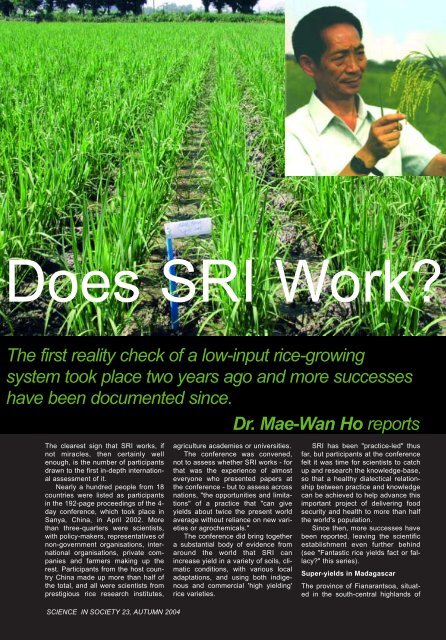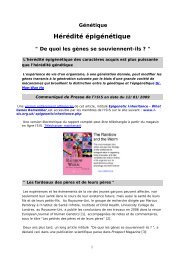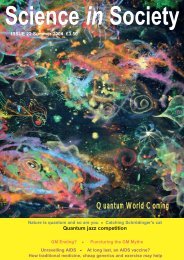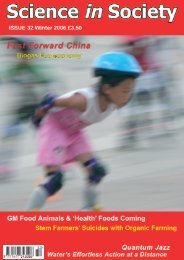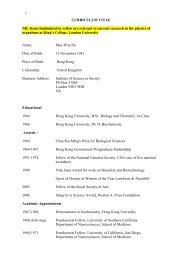Ethiopia goes organic to feed herself - The Institute of Science In ...
Ethiopia goes organic to feed herself - The Institute of Science In ...
Ethiopia goes organic to feed herself - The Institute of Science In ...
You also want an ePaper? Increase the reach of your titles
YUMPU automatically turns print PDFs into web optimized ePapers that Google loves.
14<br />
Does SRI Work?<br />
<strong>The</strong> first reality check <strong>of</strong> a low-input rice-growing<br />
system <strong>to</strong>ok place two years ago and more successes<br />
have been documented since.<br />
Dr. Mae-Wan Ho reports<br />
<strong>The</strong> clearest sign that SRI works, if<br />
not miracles, then certainly well<br />
enough, is the number <strong>of</strong> participants<br />
drawn <strong>to</strong> the first in-depth international<br />
assessment <strong>of</strong> it.<br />
Nearly a hundred people from 18<br />
countries were listed as participants<br />
in the 192-page proceedings <strong>of</strong> the 4-<br />
day conference, which <strong>to</strong>ok place in<br />
Sanya, China, in April 2002. More<br />
than three-quarters were scientists,<br />
with policy-makers, representatives <strong>of</strong><br />
non-government organisations, international<br />
organisations, private companies<br />
and farmers making up the<br />
rest. Participants from the host country<br />
China made up more than half <strong>of</strong><br />
the <strong>to</strong>tal, and all were scientists from<br />
prestigious rice research institutes,<br />
agriculture academies or universities.<br />
<strong>The</strong> conference was convened,<br />
not <strong>to</strong> assess whether SRI works - for<br />
that was the experience <strong>of</strong> almost<br />
everyone who presented papers at<br />
the conference - but <strong>to</strong> assess across<br />
nations, "the opportunities and limitations"<br />
<strong>of</strong> a practice that "can give<br />
yields about twice the present world<br />
average without reliance on new varieties<br />
or agrochemicals."<br />
<strong>The</strong> conference did bring <strong>to</strong>gether<br />
a substantial body <strong>of</strong> evidence from<br />
around the world that SRI can<br />
increase yield in a variety <strong>of</strong> soils, climatic<br />
conditions, with various local<br />
adaptations, and using both indigenous<br />
and commercial 'high yielding'<br />
rice varieties.<br />
SRI has been "practice-led" thus<br />
far, but participants at the conference<br />
felt it was time for scientists <strong>to</strong> catch<br />
up and research the knowledge-base,<br />
so that a healthy dialectical relationship<br />
between practice and knowledge<br />
can be achieved <strong>to</strong> help advance this<br />
important project <strong>of</strong> delivering food<br />
security and health <strong>to</strong> more than half<br />
the world's population.<br />
Since then, more successes have<br />
been reported, leaving the scientific<br />
establishment even further behind<br />
(see "Fantastic rice yields fact or fallacy?"<br />
this series).<br />
Super-yields in Madagascar<br />
<strong>The</strong> province <strong>of</strong> Fianarantsoa, situated<br />
in the south-central highlands <strong>of</strong><br />
SCIENCE IN SOCIETY 23, AUTUMN 2004


